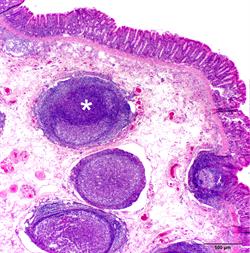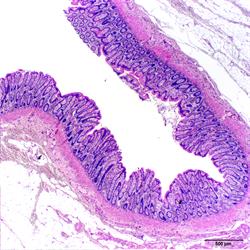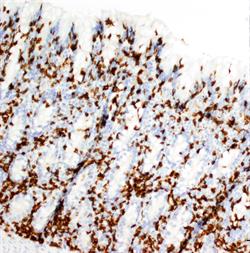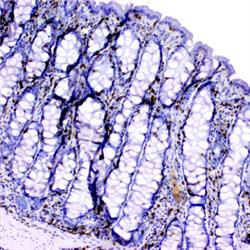The role of the equine microbiome in colic is the focus of new research at Penn Vet’s New Bolton Center.
Researchers are analyzing microbiome data from horses undergoing surgery, comparing horses given antimicrobials to horses that were not given antimicrobials. Preliminary data shows antimicrobials have a significant effect on the equine microbiome.
Researchers also continue to investigate the significance of intestinal inflammation in horses with recurrent colic: completing analysis of the fecal microbiome of horses with colic and then comparing it to horses with no history of colic.
Dr. Julie Engiles, Assistant Professor of Pathology, and Dr. Louise Southwood, Associate Professor of Emergency and Critical Care and a specialist in colic surgery, are working with a team at New Bolton Center to conduct this research, including Dr. Dipti Pitta, Assistant Professor of Ruminant Nutrition, and Dr. Holly Stewart, Surgery Resident.
 The microbiome refers to the diversity of microorganisms that colonize the gastrointestinal tract, (as well as other parts of the body) and have a synergistic relationship with their host. In the past two decades, large-scale surveys of the human gut microbiome have shown that the microbiome plays a critical role in host immune responses. Any disturbance to the symbiotic relationship can cause a microbial imbalance (dysbiosis) leading to the development of diseases, ranging from obesity to inflammatory bowel disease.
The microbiome refers to the diversity of microorganisms that colonize the gastrointestinal tract, (as well as other parts of the body) and have a synergistic relationship with their host. In the past two decades, large-scale surveys of the human gut microbiome have shown that the microbiome plays a critical role in host immune responses. Any disturbance to the symbiotic relationship can cause a microbial imbalance (dysbiosis) leading to the development of diseases, ranging from obesity to inflammatory bowel disease.
The connection between the microbiome and disease is a growing area of interest in equine medicine. The equine gastrointestinal microbiome profile reflects an intrinsic combination of the environment, exposure to immune insults, and long-term diet, but can be affected by short-term dietary or environmental changes (such as stress, disease, or surgery), which may induce transient effects.
Penn Vet’s Work with the Microbiome
 Penn Vet recently established the Center for Host-Microbial Interactions (CHMI) to investigate the role of microbes in health and disease. A diverse group of researchers at New Bolton Center – including nutritionists, pathologists, surgeons, and basic science researchers – are collaborating to further our understanding of the equine microbiome.
Penn Vet recently established the Center for Host-Microbial Interactions (CHMI) to investigate the role of microbes in health and disease. A diverse group of researchers at New Bolton Center – including nutritionists, pathologists, surgeons, and basic science researchers – are collaborating to further our understanding of the equine microbiome.
The group’s focus has been to investigate the role of the microbiome in postoperative complications, the impact of perioperative antimicrobial drugs on the microbiome of horses undergoing surgery, and importantly, the role of the microbiome in colic.
Initial Study Focuses on Method of Sample Collection
In human patients, specific guidelines have been established for sample collection for microbiome analysis. Because the fecal microbiome may change with exposure to the environment (e.g., air, stall floor), we performed an initial study to optimize and standardize methods of sample collection. The concern was that, if the sample had prolonged exposure to air, bacteria needing air (aerobes) would multiply, and bacteria that prefer an environment without air (anaerobes) would die. If that occurred, collection of a fecal sample from the stall floor would not be a reliable representation of what is occurring in the horse.
We were able to confirm that collection of a sample from the center of the fecal ball resulted in consistent proportions of bacteria for up to 24 hours. This is important because it is considerably more convenient to collect a sample from the stall floor than from the horse’s rectum.
Antimicrobial Use and Diarrhea
 With validation of our methods, we have pursued additional studies. Antimicrobials (antibiotics) are frequently used in horses undergoing surgical procedures to prevent infection (prophylaxis). Antimicrobial use has also been associated with diarrhea, which can be fatal to horses. Only a low proportion of horses given antimicrobials develop diarrhea.
With validation of our methods, we have pursued additional studies. Antimicrobials (antibiotics) are frequently used in horses undergoing surgical procedures to prevent infection (prophylaxis). Antimicrobial use has also been associated with diarrhea, which can be fatal to horses. Only a low proportion of horses given antimicrobials develop diarrhea.
There is little understanding of which horses will get diarrhea and which horses will not. We are in the process of analyzing the microbiome data from horses undergoing surgery, comparing horses given antimicrobials to horses that were not given antimicrobials.
Preliminary data shows that bacterial lineages from the bacteria Firmicutes and Bacteroidetes constitute the majority of the gut microbiome. However, we have found a significant increase in Bacteroidetes at the expense of Firmicutes with administration of antimicrobials on the equine microbiome.
These findings will form the basis for future studies investigating the possible benefit of probiotics on preventing antimicrobial-associated diarrhea and our understanding of other complications following surgery.
New Bolton Center Research into the Equine Microbiome and Colic
Colic is considered the leading cause of death in horses. While we have made several advances in the past decade in anesthesia, surgery, and postoperative management to improve the survival of horses with colic (particularly horses requiring surgery for colic), recurrent colic remains a frustrating problem for horse owners, caregivers, and  veterinarians. In a retrospective study that we recently completed, we identified that a fairly high proportion of horses with recurrent colic have low-grade intestinal inflammation.
veterinarians. In a retrospective study that we recently completed, we identified that a fairly high proportion of horses with recurrent colic have low-grade intestinal inflammation.
We continue to investigate the significance of intestinal inflammation in horses with recurrent colic. However, we are in the process of completing our analysis of the fecal microbiome of horses with colic and comparing it to horses with no history of colic. The results are pending.
Ultimately, we hope that this research will culminate in a larger-scale investigation of the role of diet, exercise, microbiome analysis, parasites, and intestinal inflammation in horses with recurrent colic in order to try to manage these horses more successfully.
Additional Microbiome Studies at New Bolton Center
Other microbiome research being performed at New Bolton Center includes:
- An investigation of the role of the gut microbiome in improving both the yield and composition of milk in dairy cows and developing strategies to manipulate the gut microbiome for sustained milk production.
- A study to better understand microbial dynamics in Johne’s disease-infected dairy cows and if changes in gut microbial ecology can assist in early detection of the disease. We anticipate that these results will help us develop alternative therapeutic interventions to treat Johne’s disease.
- A pilot investigation using a translational mini pig model to determine the role of the oral microbiome in periodontal disease. Periodontal disease is a chronic disease affecting humans ages 30 and over. By tracking changes in the oral microbiome during the course of periodontal disease, we may be able to develop therapeutic measures to reduce the incidence of disease.
- A study to unravel the linkage between periodontal disease and arthritis. Oral pathogens were found to be associated with cardiovascular disease and arthritis. Using our established translational mini pig model, we will explore the connections between periodontal disease and arthritis.
- A collaborative study to validate rumen microbial transfaunation or fecal microbial transplantation as alternative therapeutic strategies to manipulate the disturbed gut microbiome and restore a “healthy” gastrointestinal system.